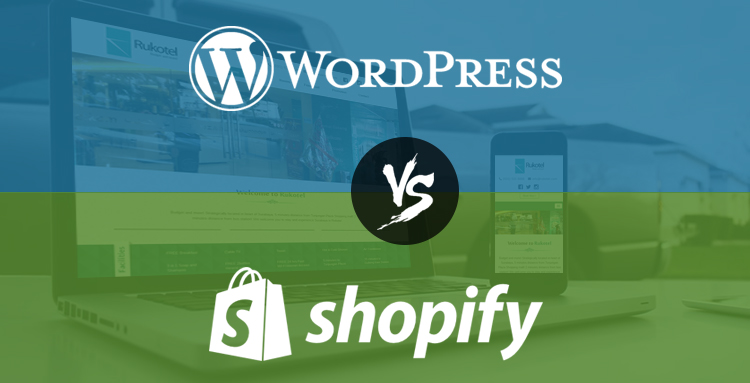Shopify vs. WordPress: Choosing the Best E-commerce Platform for Your Business
Choosing between shopify or wordpress for ecommerce platform is a pivotal decision that can significantly influence your business’s success. Both platforms offer distinct advantages and challenges. In this blog post, we’ll delve into the pros and cons of each to help you determine which aligns best with your business needs.

Shopify: The E-commerce Powerhouse
Shopify is a dedicated e-commerce platform that allows users to build and customize online stores quickly and easily. Here are some of its key advantages:
Ease of Use:
Shopify is known for its user-friendly interface, making it accessible to beginners and experienced users alike. Its drag-and-drop functionality allows you to create a professional-looking store without any coding knowledge.
All-in-One Solution:
Shopify offers a comprehensive set of features, including hosting, security, payment processing, and inventory management. This all-in-one approach simplifies the setup process and ensures that all components work seamlessly together.
Scalability:
Whether you’re a small business just starting or a large enterprise, Shopify can scale with your needs. It offers various pricing plans with different levels of functionality, allowing you to upgrade as your business
App Store:
Shopify’s extensive app store provides access to thousands of third-party apps and integrations. These apps extend the platform’s functionality, allowing you to add features like email marketing, customer support, and analytics.
Mobile Optimization:
With a growing number of consumers shopping on mobile devices, Shopify ensures that your store is fully optimized for mobile browsing. Its responsive design templates and mobile app make it easy for customers to shop on the go.
Abandoned Checkout Recovery:
Shopify offers an inbuilt feature for abandoned checkout recovery. This feature automatically sends follow-up emails to customers who have abandoned their carts, reminding them to complete their purchases. By recovering potentially lost sales, this feature helps increase conversion rates and revenue.
Maintenance-Free Operation:
One of the key advantages of Shopify is its maintenance-free operation. As a hosted solution, Shopify takes care of server maintenance, software updates, and security patches on your behalf. This frees you from the hassle of managing technical aspects and allows you to focus on growing your business.
High-Security System:
When evaluating Shopify or WordPress for ecommerce, security is a critical factor to consider.
Shopify
Shopify is a hosted platform that prioritizes security by default. It provides SSL certificates for data encryption, ensuring secure data transmission between your store and customers. Shopify is PCI DSS compliant, meeting industry standards for handling credit card information securely. Additionally, features like two-factor authentication (2FA) add an extra layer of protection against unauthorized access.
WordPress
WordPress, when used for ecommerce (typically with the WooCommerce plugin), requires proactive security measures. Implementing SSL certificates is essential for data encryption. Regularly updating the WordPress core, themes, and plugins helps protect against vulnerabilities. Utilizing security plugins such as Wordfence or Sucuri can provide firewall protection and malware scanning. Enabling two-factor authentication (2FA) enhances login security.
Despite its many advantages, Shopify also has some limitations:
1. Cost:
While Shopify’s pricing plans are reasonable for small to medium enterprise businesses, they can become expensive as you scale up or require additional features. It is less recommended if you have very less SKUs and a low marketing budget.
2. Customization Limitations:
While Shopify offers a range of customizable themes and a built-in editor, it may not provide the same level of flexibility as WordPress. Advanced customization may require knowledge of Shopify’s proprietary coding language, Liquid.
3. Dependency on Shopify:
When you build your store on Shopify, you’re essentially tied to their platform. While this simplifies maintenance and updates, it also means you have less control over your store’s infrastructure.

WordPress: The Versatile Content Management System
WordPress is a widely-used content management system (CMS) known for its flexibility and customization options. With the help of e-commerce plugins like WooCommerce, WordPress can be transformed into a powerful e-commerce platform. Here are some of its advantages:
1. Flexibility:
WordPress offers unparalleled flexibility, allowing you to customize every aspect of your online store. With thousands of themes and plugins available, you can create a unique and tailored shopping experience for your customers.
2. Ownership and Control:
Unlike Shopify, which is a hosted solution, WordPress gives you full control over your website’s hosting and infrastructure. This means you can choose your hosting provider, manage backups, and have complete ownership of your data.
3. Cost-Effectiveness
When evaluating Shopify or WordPress for eCommerce, cost-effectiveness is a crucial factor. WordPress, particularly when integrated with WooCommerce, offers a flexible and budget-friendly solution for building an online store. The WordPress software itself is free; however, expenses such as hosting, themes, plugins, and other add-ons will arise. Despite these additional costs, WordPress often remains more economical than Shopify’s subscription-based model, especially for larger businesses. While initial development costs may be comparable between the two platforms, Shopify’s ongoing monthly fees can accumulate over time. This makes WordPress a financially sustainable option in the long run, allowing businesses to allocate more resources toward growth and expansion.
4. SEO-Friendly
WordPress is highly optimized for search engines, making it easier for your store to rank well in search results. With the help of SEO plugins and tools, you can further enhance your store’s visibility and attract more organic traffic.
5. Community Support:
When evaluating Shopify or WordPress for eCommerce, it’s essential to consider the strengths and challenges each platform presents. Focusing on WordPress, one notable advantage is its extensive and active community of developers, designers, and users. This vibrant ecosystem contributes significantly to WordPress’s ongoing development and offers a wealth of resources, tutorials, and forums. Such community support ensures that users have access to solutions and guidance, facilitating problem-solving and enhancing store performance.
However, WordPress also has its drawbacks:
Maintenance: Operating as a self-hosted platform, WordPress demands regular upkeep to maintain security and optimal performance. Users are responsible for managing software updates, applying security patches, and performing backups to ensure the smooth operation of their eCommerce store.
Learning Curve: While WordPress offers considerable flexibility, it presents a steeper learning curve compared to platforms like Shopify. Setting up and customizing an eCommerce store may require technical knowledge, especially for those unfamiliar with website development and design. This complexity might necessitate investing time in learning or seeking professional assistance.
6. Integration Complexity:
While WordPress offers a wide range of plugins for e-commerce functionality, integrating them seamlessly can sometimes be challenging. Compatibility issues between plugins or with WordPress updates may require troubleshooting and technical expertise.

Shopify and WordPress ultimately depends on your specific business needs, budget, and technical expertise. Here are some recommendations based on different scenarios:
1. Choose Shopify if:
-
- A. You’re a small to medium-sized business looking for a user-friendly and all-in-one e-commerce solution.
-
- You prioritize ease of use, scalability, and reliability over extensive customization options.
-
- You prefer a hosted platform that takes care of hosting, security, and updates for you.
- When evaluating Shopify or WordPress for ecommerce, it’s essential to consider factors like maintenance and security. Shopify offers a hosted solution that manages server maintenance, software updates, and security patches, allowing you to focus on growing your business without technical concerns. With features such as SSL encryption, PCI compliance, and regular security audits, Shopify ensures robust protection for your store and customer data.
- Choosing between Shopify or WordPress for ecommerce depends on your business needs and technical capabilities. If you prefer a maintenance-free, secure platform that allows you to focus on operations, Shopify may be the ideal choice. Conversely, if you seek customization and have the resources to manage technical aspects, WordPress could be a suitable option.
2. Choose WordPress if:
-
- You’re a small to medium business or enterprise with more complex e-commerce requirements and customization needs.
-
- You value flexibility, control, and ownership of your website’s infrastructure and data.
-
- You have the technical knowledge or access to resources to manage and maintain a self-hosted website.
-
- You have less budget for marketing.
- When evaluating Shopify or WordPress for eCommerce, it’s crucial to consider how each platform supports search engine optimization (SEO) to enhance your store’s visibility.WordPress, especially when paired with plugins like WooCommerce, offers a robust and adaptable environment for building and managing e-commerce websites. Its inherent SEO-friendly structure, combined with tools such as Yoast SEO, allows for detailed on-page optimization, helping your store rank higher in search engine results.

Introducing Digital Nerd: Your Expert in Shopify and WordPress Solutions
Are you seeking a seamless online presence that leverages the strengths of Shopify or WordPress for ecommerce? Look no further than Digital Nerd, your go-to expert for cost-effective and stunning website designs tailored to your unique needs. We specialize in crafting dynamic websites on both Shopify and WordPress platforms, offering the best of both worlds. Whether you’re a budding entrepreneur or an established business looking to revamp your online store, we’ve got you covered.
Our Services Include:
1. Custom Website Design:
e design an e-commerce website with 72 advanced features. Our team of skilled designers and developers will work closely with you to create a visually captivating website that reflects your brand identity and resonates with your target audience. kindly check all features by clicking this link https://digitalnerd.in/72-must-have-features-for-your-ecommerce-website/
2. Needs Assessment:
We’ll start by conducting a thorough needs assessment to understand your business requirements, goals, and preferences. By gaining insight into your unique challenges and objectives, we’ll be able to recommend the platform that best aligns with your needs.
3. Platform Comparison:
We’ll provide an in-depth comparison of Shopify and WordPress, highlighting the pros and cons of each platform based on your specific requirements. From ease of use to customization options, we’ll break down the key factors to help you make an informed decision.
4. Customization Options:
If you value flexibility and customization, we’ll explore how WordPress can empower you to create a tailored website that reflects your brand identity and meets your functional needs. Alternatively, if you prioritize simplicity and ease of use, we’ll demonstrate how Shopify’s intuitive interface and pre-built features can streamline the process.
5. Scalability and Growth:
Depending on your long-term growth plans, we’ll evaluate the scalability of each platform and its ability to accommodate your evolving needs. Whether you’re a startup looking to scale quickly or an established enterprise seeking stability, we’ll recommend the platform that offers the scalability and flexibility you require.
6. Cost Considerations:
We’ll provide a comprehensive cost analysis, comparing the expenses associated with Shopify and WordPress, including hosting, plugins, themes, and ongoing maintenance. By evaluating the total cost of ownership for each platform, we’ll help you choose the option that fits within your budget without sacrificing functionality.
7. Full Training for Backend Management:
We believe in empowering our clients to take control of their websites. That’s why we provide comprehensive training on backend management, ensuring you have the knowledge and skills to make updates and modifications with ease.
8. Google Analytics and Facebook Pixel Integration:
Understanding your website’s performance is crucial for success. We’ll integrate Google Analytics and Facebook Pixel seamlessly into your website, allowing you to track visitor behaviour, monitor conversions, and optimize your marketing efforts.
9. Payment Gateway and Shipping Integration:
Simplify the checkout process for your customers with seamless payment gateway integration. Whether you prefer Shopify Payments, PayPal, or other payment providers, we’ll ensure a smooth and secure transaction experience. Additionally, we’ll integrate shipping solutions to streamline order fulfilment and logistics.
10. Customized Marketing Plan and Competitor Analysis:
Gain a competitive edge with our customized marketing plans tailored to your business goals and target audience. We’ll conduct a thorough competitor analysis to identify opportunities and develop strategies to help you stand out in the market
11. Training and Support:
Whichever platform you choose, we’ll provide personalized training and ongoing support to ensure you feel confident managing your website. From backend management to troubleshooting, our team will be available to assist you every step of the way.
12. Final Recommendation:
Based on our assessment and your feedback, we’ll make a final recommendation on the platform that we believe will best serve your business needs. Whether it’s Shopify, WordPress, or a combination of both, our goal is to help you make the right choice for your business’s success. With Digital Nerd’s expertise and guidance, you can feel confident that you’re choosing the right platform for your business. Contact us today to get started and take the first step towards building a powerful online presence that drives results. Call us at any time on 9892489826/8850533490.
Know More About : Choosing the Right Tech Stack: Shopify, WordPress, Magento, and MERN (MongoDB, ExpressJS, ReactJS, NodeJS)
